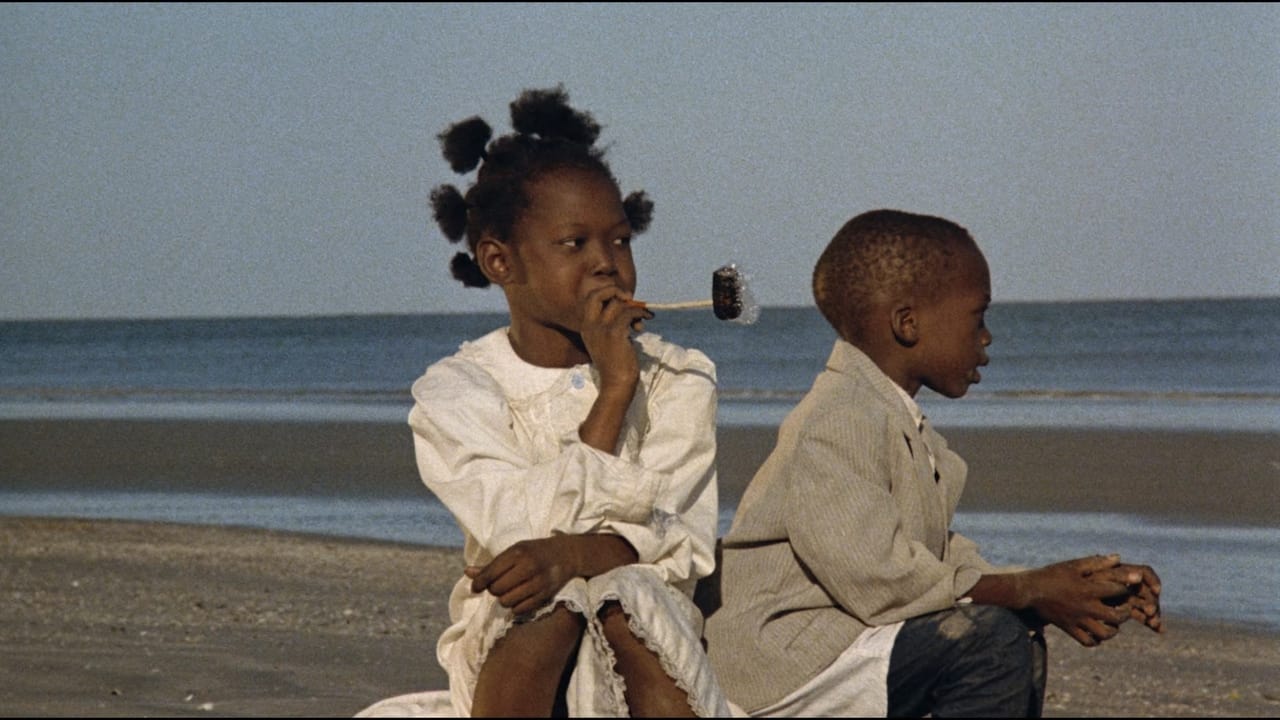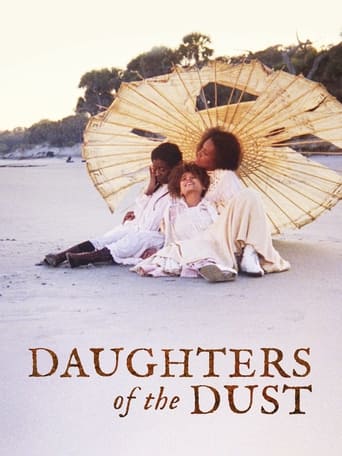

SERIOUSLY. This is what the crap Hollywood still puts out?
... View MorePretty Good
... View MoreIn other words,this film is a surreal ride.
... View MoreExcellent and certainly provocative... If nothing else, the film is a real conversation starter.
... View MoreBeautiful movie/ scenery, just wished there was more of a continuous script in the dialogue.
... View MoreIt's tough to sort my feelings on Daughters of the Dust. The film is built around a compelling and often forgotten segment of black history that maintains social resonance beyond its time and place; director Julie Dash deserves credit for capturing the emotion and pain of cultural transformation, and there are lovely images throughout. But Daughters of the Dust makes very little effort to engage the audience: it's difficult to maintain a sense of each character's individual goals, and the film often sacrifices narrative momentum for visual poetry. Unfortunately, I'm left with a film that interests me more in theory than in practice. -TK 9/30/10
... View MoreSPOILER BE AWARE OF A SPOILERThe film `Daughters of the Dust' is a film that gives us the audience a feeling of what happened to African Americans after slavery and before the modernization of the times. This film was set in 1902 and is set on an island with a group of African Americans who are all in some form or another part of the same family. The fascinating thing about this film is that there are multiple generations of people that live on this island. In this film the dilemma is that the family is getting ready to leave the island to go to the main continental United States. The problem is that many family members feel differently about this journey to the new world. However, they were not the first ones to decide to leave. One of their relatives Yellow Mary, and another went and left this island and returned to help the others to leave. This story takes so many different turns, and has so many stories in it. There is Yellow Mary's transformation from wanting to be on the move all the time; to deciding that she wishes to stay on the island she left in the long ago at the end of the film. There is the young girl who is in love with the Native American who helps them with the work. In the end she to stays on the island and leaves her over powering mother to go to the new world with her other children. This part of the film was not very detailed, however I believe this is the best part. Whenever the Native American was shown, it appeared that he was at one with nature, and understood more things than any of us will ever know. In one scene he wrote a letter to the girl that he loved and that loved him. While she was reading the letter it was showing him sitting in a tree, and the view kept getting wider and further away. It made this man look very peaceful and caring. It also gave him the image most people have when they think of Native Americans in nature, at one with it. Another major part of this film revolved around the eldest of the group. They all called her Nana and she was so old that she had been around when there was slavery just like a few other members of the group. It was interesting how they showed the eldest people who were part of slavery had iodine permanently on their hands, to show that they worked on the plantations and dealt with what we all think of as slavery. Anyway, she was resistant to the whole family leaving this island of theirs. She wanted them all to stay and be a family, and to pass on the ways of the past to the future. Unfortunately, in the end the all left except for her, the young girl, Yellow Mary, and another couple. Finally, there is the story that revolves around the couple who are about to have a baby. The woman got pregnant by being raped, and the man did not know quite how to handle it. In the beginning the man was so happy to be going to the main land, and in the end they decided to stay there with the others. Throughout the film there was a narrator and the narrator was the unborn child, and she was discussing the story of what happened and led up to her mother and father staying on the island. The end was very powerful because it the make it very clear that it was very important for Nana to have the children born on this island, and she at least got to see the baby before she died. It was very powerful to have this narration throughout the film. Overall, I really did not enjoy this film but that is ok. It is just not the type of film I am use to watching. The drama films especially about family problems are my least favorite types of films, but I can see how some people would like it a lot.
... View MoreDaughters of the Dust is considered to be an artistic masterpiece. It's supposed to be the ideal feminist movie. After watching it, I am not sure why. I came into this movie with an open mind, even though all of my classmates had expressed distaste for the movie, but a lot of the things they talked about didn't bother me. For instance the significance of the bottle tree, and smashing it, the only really confusing part of the film for me was the fight. It wasn't clear to me if it was serious or not. The way I see it, there are two main problems in the movie. The first is the script. It is rambling, and incoherent. There is no plot structure. It just meanders around a large ensemble of characters, never really giving you a chance to know anyone well, with the possible exception of Nana. Not only does the screenplay ramble, but it is extremely preachy. This is a movie, not a sermon. If you want to get your point across, do it subtly, don't shove it down our throats repeatedly. The worst part of the script is the end. Everything just falls apart. People scream wildly in acting reminiscent of the over exaggerating silent era. The final speech on the beach, good lord; I couldn't understand the actress, but what I could understand was terrible. Way to work in that title in the script. Talk about a lame cliché! This film is reminiscent of an extremely over indulgent film students work that magically got funding for saying the magic words 'African' and 'Feminist' that managed to get into the purses of wealthy backers. The bottom line is, it doesn't matter how culturally or politically valid a movie may be, it can still be a terrible movie, and this is indeed a bore.However I want to take some time here to talk about the argument that this movie is bad because it is afro-centric. That because of its many obscure references to thing that the vast majority of white (and probably a large percentage of black) viewers don't understand. This does not condemn the movie in my opinion. Don't get me wrong, the movie is still bad, but not for these reasons. I think part of the reason the afro-centrism of this movie is targeted is because it's a bad movie overall and people blame this for it. But really, it would be a bad movie with or without the afro-centric elements. There are parts in every movie that people won't understand. A lot of times they are more subtle than in this movie. I think it is wrong to damn a movie for it's obscure references. Even if you don't have any background on this, the movie gives you enough and gets its points across well enough that you don't need one; you can understand the movie and its references. This is a double edged sword however. It may not damn the movie, but it doesn't canonize it either. I've read lots of reviews focusing on how important the movie is because it focuses on an almost forgotten part of African heritage or because of it's feminist views. I found this piece of culture and history extremely interesting, it reminded me of Last of the Mohicans. But no matter how interesting a subject matter, it can still be turned to crap, and Julie Dash has really ruined a good subject matter here.Just a thought as I reflect on the movie, but maybe the biggest problem is that there is just too much? Too many characters, too many plot points, etc etc etc. It might have worked in another medium that wasn't constrained to this length. It's just too rushed and compact and every which way but loose the way it is. Never settling on anything.Before I end this, I want to make my case for this movie. The case of how it is nothing but an art house version of How Stella Got Her Groove Back. Both film have their main characters as strong black mothers or grandmothers. Both films focus on black family dynamics. Both films focus on the differences between northern life in America and southern life on the islands. Both films focus on black culture and the many different facets of it. Both films have the exact same scene of a woman running on a beach. Both films are about maintaining a black (or African) identity in a white European world. Both films have dance scenes with large groups of blacks dancing to African/African-American music. Both films have a black relative abandoning her black relatives to be with a white (or Native American) man. Both films have almost entirely black casts. I could probably come up with more, but I think I made my point. To sum it up, I proclaim How Stella Got Her Groove Back to be `a film of visionary power, an unprecedented achievement in terms of world cinema and African aesthetics'. I also think that How Stella Got Her Groove Back is a much more feminist leaning film. The only focus on feminism I saw in Daughters of the Dust was the final breakdown speech on the beach where all of the sudden the men are completely ignored and it's all about the daughters. If you ever teach a class like this again, I would suggest screening these two films back to back as a lesson of how to understand hype and pretentious critics.
... View More